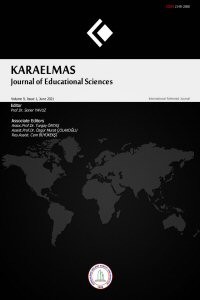İnternet Teknolojilerinin Yükseköğretime Etkileri
Bu çalışmada çerçevesi çizilen tartışmaya ışık tutmak amacıyla sistematik alanyazın taraması yöntemi kullanılarak açık ve uzaktan öğrenme alan yazını taranmıştır. Bununla beraber Kitlesel Açık Çevrimiçi Dersler, Açık Eğitim Kaynakları gibi dijital teknolojilerin açık ve uzaktan öğrenme ortamlarında yaygın şekilde kullanılmasından kaynaklanan açıklık kavramı tartışmalarına değinilmiştir. Yükseköğretim kurumlarının önümüzdeki yıllarda karşılaşabilecekleri olası senaryolar ön görülmüş ve bu senaryolar karşısında olası çözümlere yer verilmiştir
Anahtar Kelimeler:
Açık ve Uzaktan Öğrenme, Çevrimiçi Öğretim, Kitlesel Açık Çevrimiçi Kurslar, Açık Eğitim Kaynakları
The Influence of Internet Technologies on Higher Education
This study reviews the literature of open and distance education field with an aim of shedding light on the discussion drawn in the study. In the end of the review of literature, it is discussed that distance education, open education, online education and elearning are not the alternative terms of each other rather they are educational approaches that different crowd of people can reach and also that adopt different pedagogies and perspectives which has effect on higher education. In addition, the discussion of the “open” term because of the common usage of digital technologies such as Massive Open Online Courses MOOCs and Open Educational Resources OERs has been mentioned. Potential scenarios that higher education institutions may encounter in the future has been foreseen and possible solutions for these scenarios have been referred
Keywords:
Distance Education, Online Education, Massive Open Online Courses, Open Educational Resources,
___
- Bates, T. (2012). What’s right and what’s wrong about Coursera-style MOOCs. Online learning and distance education resources, moderated by Tony Bates, August 5, 2012. http://www.tonybates.ca/2012/08/05/whatsright-and-whats-wrong-about-coursera-style-moocs/ (23.01.2015 tarihinde alınmıştır).
- Bates, T. (2013). Is there a future for distance education?. http://www.tonybates.ca/2013/10/23/is-there-a-futurefor-distance-education/#sthash.xQrSB2mV.dpuf (03.02.2015 tarihinde alınmıştır).
- Bates, W.T. Sangra, A. (2011). Managing technology in higher education: strategies for transforming teaching and learning. Jossey-Bass :U.S.A.
- Carr, N. (2014). The crisis in higher education. http://www.technologyreview.com/featuredstory/429376/thecrisis-in-higher-education/ (19.01.2015 tarihinde alınmıştır).
- Creative Commons. (2014). Metrics. https://wiki.creativecommons.org/Metrics (24.01.2015 tarihinde alınmıştır).
- Ellis, D & Haguan, M. (1997). Modelling the information seeking patterns of engineers and research scientists in an industrial environment. Journal of Documentation, 53(4), 384-403.
- Fink, A (2010). Conducting research literature reviews: from internet to paper. SAGE Publication: USA.
- Friedrich, M., Wolpers, M., Shen, R., & Ullrich, C. (2011). Early results of experiments with responsive open learning environments. Journal of Universal, 17(3), 451–471.
- Gao, F., Luo, T., & Zhang, K. (2012). Tweeting for learning: a critical analysis of research on microblogging in education published in 2008-2011. British Journal of Educational Technology, 43(5), 783-801.
- Guri-Rosenblit, S., & Gros, B. (2011). E-learning: confusing terminology, research gaps and inherent challenges. The Journal of Distance Education/Revue de l’Éducation à Distance, 25.
- Hewlett. (2014). Open Educational Resources. http://www.hewlett.org/programs/education/openeducationalresources (21.01.2015 tarihinde alınmıştır).
- Hienssen, P. (2010). The new normal: Explore the limits of the digital world. Mach Media: Belgium.
- IITE Policy Brief. (2013). Introduction to MOOCs: Avalanche, Illusion or Augmentation. http://iite.unesco.org/pics/publications/en/files/3214722.pdf (22.01.2015 tarihinde alınmıştır).
- Janke, I & Norberg, A. (2013). Open education 2030: digital didactics-scaffolding a new normality of learning. http://blogs.ec.europa.eu/openeducation2030/ (25.01.2015 tarihinde alınmıştır).
- Kieslinger, B., S. Fiedler, F. Wild, & S. Sobernig (2006). iCamp: the educational web for higher education in an enlarged Europe. eChallenges e-2006, http://www.icamp.eu/wpcontent/uploads/2007/05/echallenges_final_paper.pdf (17.11.2014 tarihinde alınmıştır).
- Mackintosh, W. (2006). Modelling alternatives for tomorrow’s university: Has the future already happened? In M. F.
- Beaudoin (Ed.), Perspectives on higher education in the digital age (pp. 111–136). Nova Science: New York.
- Milligan, C. (2006). The road to the personal learning environment? http://zope.cetis.ac.uk/members/ple/resources/colinmilligan.pdf (17.11.2014 tarihinde alınmıştır).
- Munoz, J. C. Redecker, C. Vourikari, R. Punie, P. (2014). Open education 2030: planning the future of adult learning in Europe. The Journal of Open,Distance and e-Learning, 28, 3.
- Nagel, D. (2009, October 28). Most college students to take classes online by 2014. Campus Technology Online. http://campustechnology.com (27.01.2015 tarihinde alınmıştır).
- Neely,P.A, & Tucker, J.P. (2010). Unbundling faculty roles in online distance education programs. International Review of Research in Open and Distance Learning, 11(2), 20-32.
- OECD. (2011). Education at a Glance 2011: OECD Indicators. OECD Publishing. http://www.oecd.org/dataoecd/61/2/48631582.pdf (23.01.2015 tarihinde alınmıştır).
- OECD. (2013). Education at a glance 2013: OECD indicators. OECD Publishing. https://www.oecd.org/edu/eag2013%20(eng)--FINAL%2020%20June%202013.pdf (23.01.2015 tarihinde alınmıştır)
- Olivier, B. & O. Liber. (2001). The need for portable personal learning environments and supporting interoperability standards. Lifelong Learning, http://wiki.cetis.ac.uk/images/6/67/Olivierandliber2001.doc (17.11.2014 tarihinde alınmıştır).
- Rosenblit, S,R. (2014). Online distance education. distance education systems and institutions in the online era: an identitiy crisis. Athabasca Univesity Press: Kanada.
- Thierer, A. (2014). Permissionless innovation. http://mercatus.org/permissionless/permissionlessinnovation.html (22.01.2015 tarihinde alınmıştır).
- Uzaktan eğitimin tarihsel gelişimi (2015). retrieved 23.01, 2011 from Wiki: https://tr.wikipedia.org/wiki/Uzaktan_e%C4%9Fitimin_tarihsel_geli%C5%9Fimi
- Wikipedia internet kullanım oranları (2008). retrieved 23.01, 2011 from Wiki: https://tr.wikipedia.org/wiki/%C3%9Clkelere_g%C3%B6re_internet_kullan%C4%B1c%C4%B1s%C4%B1_sa y%C4%B1s%C4%B1_listesi
- Wiley, D. (2013). Where i’ve been; where i’m going. http://opencontent.org/blog/archives/2723 (22.01.2015 tarihinde alınmıştır.)
- Wiley, D. (2014). The MOOC misstep and the open education infrastructure. http://opencontent.org/blog/archives/3557 (23.01.2015 tarihinde alınmıştır).
- Yuan, L. & Powell, S (2013). MOOCs and open education: implications for higher education’ http://publications.cetis.ac.uk/2013/667 (21.01.2015 tarihinde alınmıştır).
- ISSN: 2148-2888
- Yayın Aralığı: Yılda 2 Sayı
- Başlangıç: 2013
- Yayıncı: Zonguldak Bülent Ecevit Üniversitesi
Sayıdaki Diğer Makaleler
Yabancı Dil Öğrenenlerin Motivasyon Kaynağı: İdeal Dil Benliği
Grup Değişmezliği Özelliğinin Farklı Eşitleme Yöntemlerinde İncelenmesi
Hande TANBERKAN SUNA, Şeref TAN
Yabancı Dil Eğitiminde Öz-Değerlendirmenin Gücü
Evrensel Tasarıma Dayalı Öğrenme ve Evrensel Olarak Tasarlanmış Eğitim Programlar
Cem BÜYÜKEKŞİ, Özlem AYDIN ŞENGÜLEÇ, Eralp BAHÇİVAN, Soner YAVUZ
Argümantasyonun Elektrikteki Kavramsal Anlama Üzerine Etkisi
Özlem AYDIN ŞENGÜLEÇ, Eralp BAHÇİVAN, Ali AZAR
Matematik Öğretiminde Birlikte Öğrenme Tekniğinin Kullanılması ve Değerlendirilmesi
Çocuk Haftası Dergisinin Çocuk Edebiyatı Açısından İncelenmesi
